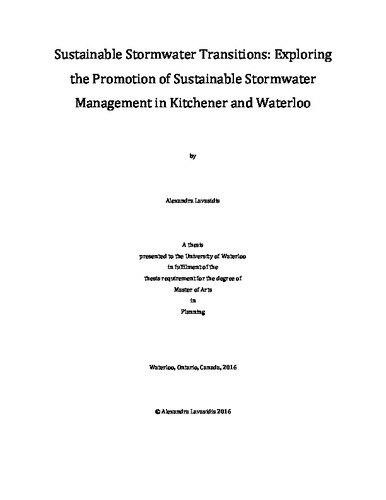| dc.contributor.author | Lavasidis, Alexandra | |
| dc.date.accessioned | 2016-08-31 18:53:37 (GMT) | |
| dc.date.available | 2016-08-31 18:53:37 (GMT) | |
| dc.date.issued | 2016-08-31 | |
| dc.date.submitted | 2016-08-26 | |
| dc.identifier.uri | http://hdl.handle.net/10012/10764 | |
| dc.description.abstract | Canadian cities are undergoing changes in the way they fund and provide stormwater management services. These changes include the promotion of sustainable stormwater management technologies. The cities of Kitchener and Waterloo are the first two municipalities in Canada to implement stormwater utility rates and stormwater credit programs that encourage the installation of sustainable stormwater management. This research utilises mixed methods research to understand how various factors have influenced the uptake of sustainable stormwater management on private residential property in Kitchener and Waterloo; why each city encountered barriers in the promotion of sustainable stormwater management, and; what solutions can be gleaned from each city’s experience in overcoming the barriers. The findings demonstrate that in Kitchener and Waterloo, socio-economic, demographic, and geographic factors had little influence on the uptake of sustainable stormwater management. Instead, the most likely group to participate were environmentalists. Findings show that the most effective strategies for encouraging sustainable stormwater management in Kitchener and Waterloo were: a targeted approach to outreach programs; ‘lightning rod issues’ that encourage action on stormwater issues; partnerships and networks to reach a wider range of participants; using multiple media and communication channels that engage property owners, while remaining cognisant of the type of property owner one is trying to reach out to (e.g. social media savvy, or not?); and strong legislation. This research addresses the need to understand barriers to sustainable stormwater transitions in a Canadian context, while transcending the inappropriately narrow focus on technical barriers that occurs within much of the literature on stormwater management. This research contributes to planning practice by providing a list of recommendations for planners attempting to promote sustainable stormwater management transitions in their municipality. It also highlights the need for collaboration across disciplines and calls for better integrated stormwater education programs in all levels of education (elementary, high school, and university planning programs). Future research can follow the next five years of the stormwater transition process in Kitchener and Waterloo to understand how new approaches, especially surrounding aesthetics-based promotion strategies, impact the uptake of sustainable stormwater management on private, residential property. | en |
| dc.language.iso | en | en |
| dc.publisher | University of Waterloo | en |
| dc.subject | stormwater management | en |
| dc.subject | promoting sustainable practices | en |
| dc.subject | sustainable stormwater management in Kitchener and Waterloo | en |
| dc.subject | Ontario stormwater management | en |
| dc.subject | low-impact development | en |
| dc.subject | green stormwater management | en |
| dc.subject | source control stormwater management | en |
| dc.title | Sustainable Stormwater Transitions: Exploring the Promotion of Sustainable Stormwater Management in Kitchener and Waterloo | en |
| dc.type | Master Thesis | en |
| dc.pending | false | |
| uws-etd.degree.department | School of Planning | en |
| uws-etd.degree.discipline | Planning | en |
| uws-etd.degree.grantor | University of Waterloo | en |
| uws-etd.degree | Master of Arts | en |
| uws.contributor.advisor | Khirfan, Luna | |
| uws.contributor.affiliation1 | Faculty of Environment | en |
| uws.published.city | Waterloo | en |
| uws.published.country | Canada | en |
| uws.published.province | Ontario | en |
| uws.typeOfResource | Text | en |
| uws.peerReviewStatus | Unreviewed | en |
| uws.scholarLevel | Graduate | en |

